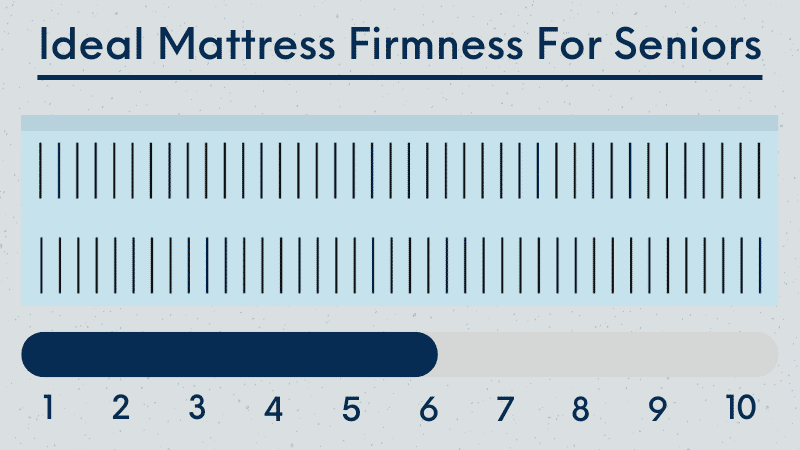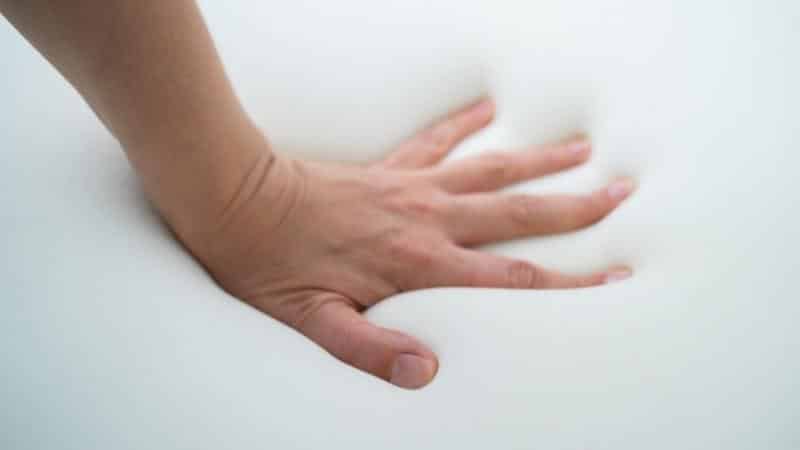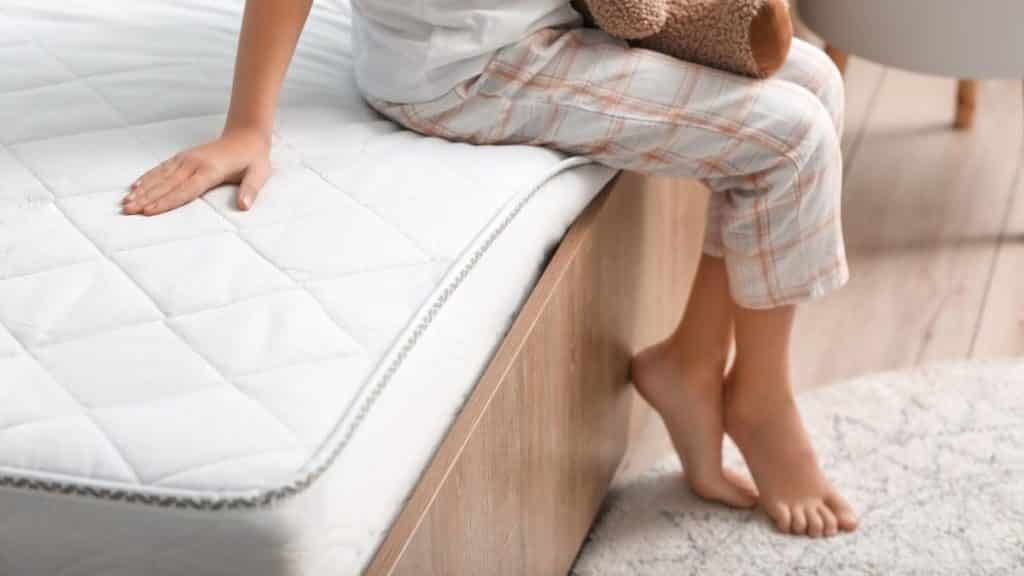Are you looking for a mattress suitable for seniors?
Maybe you are a senior looking for the best new mattress or you’re helping an elderly family member buy their new mattress?
In any case, you should understand that the best mattress for seniors should have specific features that improve sleep quality and increase comfort.
And the most important feature to consider when getting a good mattress for a senior is the firmness level.
Continue reading to find out everything you need to know about mattress firmness for seniors and the elderly.
What Mattress Firmness is Best For Elderly People, And Why?
The ideal mattress firmness for elders is a medium-firm mattress. Elders often require maximum pressure relief, and medium-firm mattresses effectively relieve pressure points, aches and pains. Medium-firm mattresses aren’t always hard. Firm and medium-firm do not imply stiffness or discomfort.

On the mattress firmness scale, medium-firm mattresses are roughly 6/10. This rating indicates that, while firm enough for a sleeper to lie on, they also provide adequate cushioning. A medium-firm mattress will not allow sleepers to sink as deeply as a much softer mattress.
When it comes to pressure relief, firmness is crucial. A good mattress for seniors will help relieve aches and pains. Chronic pain can lead to sleep disruptions. Mattress firmness or softness will dictate how comfortably and pain-free seniors with back pain sleep throughout the night.
When selecting hardness for pressure reduction, keep in mind your preferred sleeping position. For comfort, side sleepers will likely want a medium-firm mattress, while back or stomach sleepers require a firmer mattress.
Related reading:
- How Firm Should a Mattress Be For a Back Sleeper?
- How Firm Should a Mattress Be For a Stomach Sleeper?
- How Firm Should a Mattress Be For a Side Sleeper?
Things to Consider When Looking For a Good Mattress For Seniors
Do a lot of research before deciding on the mattress to buy. Allow each mattress a 15 minutes test. While you’re on the mattress, experiment with different sleeping positions. After all, the preferences of side sleepers and back sleepers may differ.
You’ll most likely be sleeping on this mattress for up to 15 years, so be sure it’s the proper one before you buy it!
Consider the following things when purchasing a mattress for elders:
Edge Support
Any decent mattress must provide support to the person sleeping on it. This can be found in the form of edge support on many mattresses. A mattress’s edge support is made of extra material or structure that prevents the mattress from drooping at the edges.
The best mattress for seniors should offer substantial edge support to make it easier to get in and out of bed each day and night. This support relieves pressure and helps with spinal alignment. Edge support also protects against nighttime injuries caused by rolling out of bed.
A strong-edged mattress also provides a pleasant spot to sit on the bed’s edge without sinking.

Firmness
The best mattress for elders is a moderately firm one. Seniors often require maximum pressure relief, and medium-firm mattresses effectively relieve pressure points, aches and pains. Medium-firm mattresses aren’t always hard. Firm and medium-firm do not imply stiffness or discomfort.
When selecting hardness for pressure reduction, keep in mind your preferred sleeping position. For comfort, side sleepers will likely want a medium-firm mattress, whilst back or stomach sleepers require a firmer mattress.
Thickness
A good mattress has a comfortable amount of thickness in addition to layers and firmness. The best mattress for elders should be thick enough to provide adequate cushioning while remaining firm enough to ensure proper spinal alignment.
Comfortable mattresses range in thickness from eight to fourteen inches, leaving plenty of room for personal preferences.
Motion Isolation
Motion-isolating mattresses keep sleeping partners from annoying one another by moving around during the night. Because seniors sleep lightly, even a small motion transmission can wake them up.
An excellent mattress should keep elderly couples from feeling each other’s movements. People who wake up frequently throughout the night owing to a variety of sleep disorders will not have to worry about disturbing the other person in the bed.
Cooling
A breathable mattress with an open-cell structure is another mattress style that is excellent for elderly seniors. In the winter, this mattress allows air to flow freely within the mattress, resulting in less muscle tenseness.
Like infants, seniors have sensitive bodies that require a mattress that is less prone to frostbite in the winter.
This mattress allows air to flow freely within the mattress, causing less muscle tenseness in the winter months.
Materials
Quality materials should be at the top of your priority list while looking for the best mattress for elders. Not all mattress materials are healthy or beneficial to your health. Customers should opt for a new mattress constructed of materials that will not cause respiratory distress or other issues.
A memory foam mattress, for example, is constructed of a polyurethane and petroleum-based chemicals. Because it’s not organic or natural, it’ll emit volatile organic compounds (VOCs), which might irritate healthy people. Seniors are more likely to have these negative effects.
Some memory foam mattresses are of superior quality and contain fewer chemicals, while others are entirely organic and better for general health and wellness. The best mattress for seniors will always encourage health and happiness.
Cost
The cost of any major purchase is essential. A mattress for elders should not be costly. Many senior citizens, such as social security workers, live on fixed budgets and cannot afford to spend exorbitant sums of money on luxuries.
A nice mattress is needed, but a reasonable price range is critical when it comes to the best mattress for seniors.
5 Signs Indicating That You Need a Firm Mattress

You wake up with an aching lower back.
An aching lower back is a common sign of a too soft mattress. This is the first thing you feel once you get out of your bed in the morning. While there are many reasons for a sore lower back, recurring morning aches and pains are usually a sign that your bed is the source of discomfort.
Taking too long to get comfortable.
Tossing and turning regularly; stress, anxiety, and even worse health can all contribute to insomnia. However, the length of time it takes to get comfortable at night is influenced by your mattress.
If you’re continually shifting your position, it could be an indication that your muscles aren’t able to rest fully…a symptom that your mattress is too soft.
You sleep on your stomach and wake with neck or shoulder pain.
The firmness of a mattress is essential for stomach sleepers. Because of the unnecessary twisting in that posture, sleeping on your stomach already puts extra strain on your neck, jaw, and upper back.
If you sleep on your stomach and know you’re using the proper pillow for your sleeping position but still get neck and shoulder pain, your hips may be sinking too far into the mattress.
You experience difficulties when getting in and out of bed.
How difficult is it for you to get in and out of your bed? If you find yourself “stuck” in your bed and have trouble getting up and off the mattress, it’s an indication your mattress is too soft. While memory foam and other highly conformable materials might add to the problem, feeling “stuck” in a hybrid mattress or one with latex or latex-alternative foam is a good indicator that firmness is absent.
Feeling like you’re “bottoming out” as you hop into bed.
A quality mattress will have three layers or more. These are the top comfort layer, the middle transitional layer, and the bottom support layer most common. If you sink too much on your mattress, it means it is too soft because the transitional layers are designed top conform with your body curves and offer maximum comfort.
5 Signs Indicating That You Need a Soft Mattress

Back pain
The most prevalent symptom you should consider increasing the hardness of your mattress is back pain. An excessively soft mattress might contribute to a bent spine and fail to support vital pressure points.
Neck/shoulder pain
Neck and shoulder pain, particularly in stomach sleepers, can indicate that your hips are sinking into the mattress. Your spine should be in a neutral position when sleeping, as previously said. The position of your head creates tension on your neck and shoulders while you sleep on your stomach. An excessively soft mattress will not help to relieve this stress.
A soft mattress can also cause your spine to flex and leave important pressure points in your hips unsupported, putting your neck and spine out of alignment for hours.
Finding it hard to get in and out of bed
This widespread issue is frequently disregarded or dismissed as a minor annoyance, but we take it very seriously. Good quality of life depends on being able to get out of bed.
Nothing is more demoralizing than sinking into the mattress’s edge or straining to get out of bed. You’ve already gotten off to a bad start when you add back or neck pain to the mix.
A soft mattress cannot provide the edge support that a firm mattress provides. Even if some edge support is provided, the body’s natural tendency to sink into the center of the mattress and struggle to climb over the edge and out of bed is worsened.
A firmer mattress provides a broader, more fully supported sleeping surface, making it easier to get in and out of bed without stumbling or waking your companion.
Discomfort
Passive discomfort can be caused by foams that do not respond to changes in pressure or body movement. Everyone has those nights when they toss and turn a little before falling asleep. Still, if you can’t get comfortable night after night and are continually in pain, it could be an indication that your mattress isn’t supportive enough.
Having a mattress with coils as well as firmer, higher-density foams can be beneficial. The coils protect you from feeling “stuck in the mud” as you might with an all-foam mattress, while the high-density foams keep your sleep surface supportive and comfortable.
Lumps
The materials included in a regular mattress (especially an innerspring one) tend to shift about after hours of sleeping on the same surface night after night, causing lumps you can feel on your sleeping surface.
With use, the chances of uneven surfaces and more discomfort increase. Being comfortable on a mattress with moved materials frequently involves resting between the bumps, which means your body sleeps with very little support.
This can be avoided using a firmer mattress with firmly packed materials and high-quality construction, particularly one with mattress tufts. Tufts, in particular, can hold the mattress layers in place and almost minimize material moving, which can result in decreased comfort, lumpiness, and drooping.
Mattress sagging
Mattress sagging is more common in people who are larger in stature.
The quality and density of the foam layers are the cause of mattress sagging. Over time, a soft mattress can droop, allowing your body to sink in and causing your spine to misalign. You might benefit from a firmer mattress that avoids drooping if you have that sinking feeling (which even good edge support can’t fix!).
Sleep disorders
A firmer mattress may help you sleep better if you have insomnia, sleep apnea, or other sleep disorders. Firmer mattresses, for example, keep you supported and raised over time, preventing sagging and sinking.
Rather than sleeping on a mattress, stay on top of it to keep your airways open and treat sleep apnea symptoms. A more supportive mattress, with no bumps or sinking, can also improve comfort and help prevent sleeplessness.
Our Top Mattress Picks For Seniors & Elderly
Firmer WinkBed: Best For Back Pain
The Firmer WinkBed has a comfort system that conforms to the body gently and a zoned support core. This combination is of great help for back pain sufferers who require additional assistance to maintain proper spinal alignment while sleeping.
Nolah Evolution 15: Best For Spinal Alignment
The firmness of the Nolah Evolution 15 is available in three levels: medium (5), medium-firm (6), and firm (8). Because of this, the mattress is suitable for most people, regardless of their weight or sleeping position. When you get into bed, the rich Euro-top design offers an invitingly velvety sensation, while a robust coil structure hinders excessive sinkage.
Multiple foam layers adapt to the shape of your spine, evenly distributing weight and relieving pressure. The Evolution 15’s patented foams are designed to release heat rather than absorb it, so users shouldn’t become too hot while sleeping on it. Pocketed coils in the support core are localized to reinforce the center and prevent excessive edge sinkage.
Casper Wave Hybrid Mattress: Best Mattress for Seniors with Arthritis
If you have arthritis, you must sleep on the correct mattress. You’ll want a bed that won’t let you sink too deeply into it, as this can cause joint strain, but you also don’t want one that’s too firm and won’t provide you with the pressure relief you require. The Casper Wave Hybrid is the ideal compromise: its pocketed coils provide solid support, while the soft top layers of foam soften sensitive joints.
Does Medicare Cover Mattresses For Seniors?

If you’re a senior on Medicare, you should know that the program covers not all mattresses. However, only specific mattresses are eligible and must meet certain conditions.
Part B of Medicare pays for mattresses that are classified as durable medical equipment (DME). This is the medically necessary equipment that your doctor has prescribed for your health on a daily basis.
Blood sugar monitors and test strips, hospital beds, and walkers are examples of DME that Medicare covers. Additionally, certain mattresses are also covered. Pressure-relieving mattresses, mattress overlays, and beds will all be covered by Medicare.
